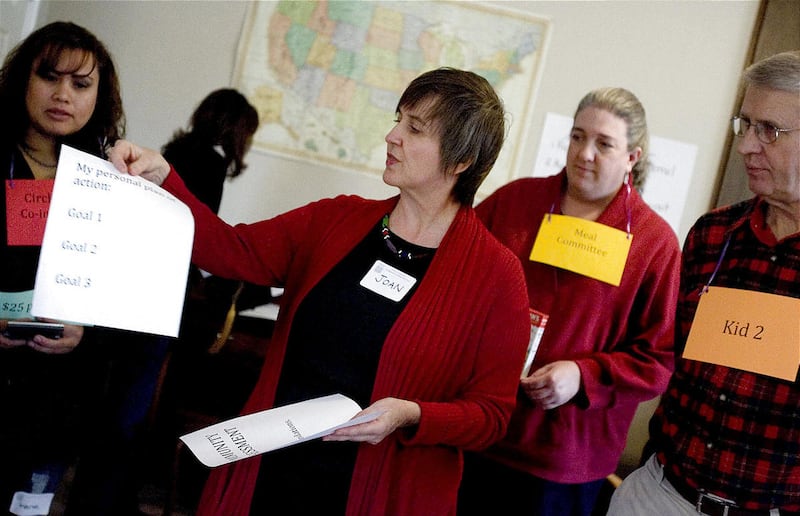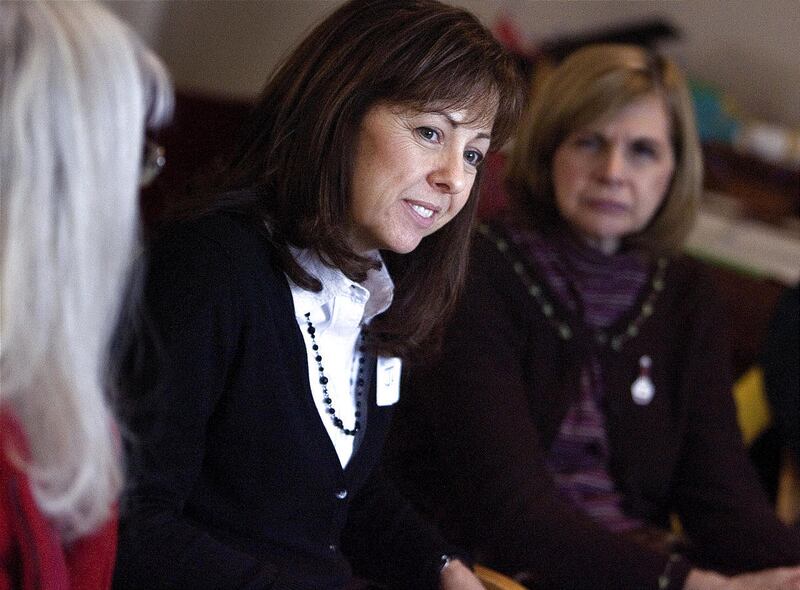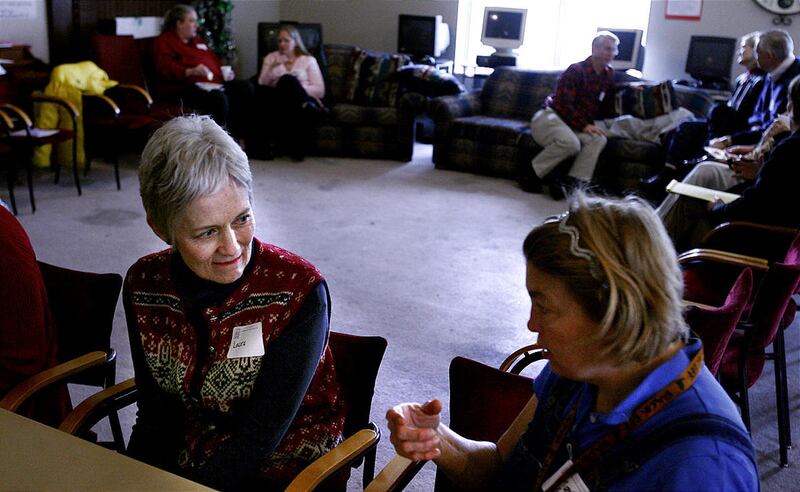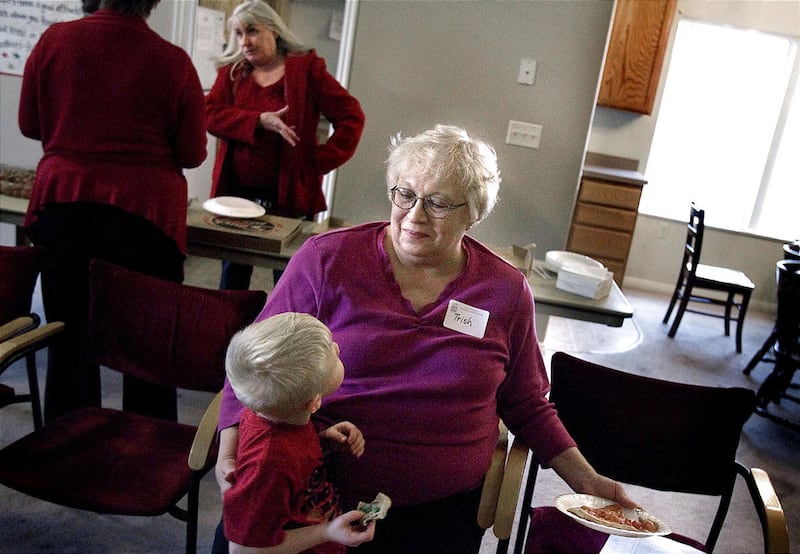PROVO — Mary Bennion stands in the middle of the group, nervously scratching her arm but grinning. She's wearing denim overalls rolled up at the ankles and a placard around her neck labeled "circle leader." In her arms is the book, "Getting Ahead in a Just-Get-By World," a magnifying glass and a tape measure, metaphorical tools she will use to reshape her life. There's also the box of rice representing the worry of what she'll eat each day.
"Mary has a lot on her plate right now," explains Joan Dixon, Circles Coach. "But Circles has a way to help out."
Circles is a national campaign aimed at eliminating poverty by educating low-income individuals, like Mary, and then linking them with middle- and upper-class allies who will provide support, advice and friendship along the path to self-sufficiency. The Provo program is the first of its kind in Utah.
"The No. 1 rule we talk about in Circles is that this is about helping each other to reach our best potential," said Karin VanZant, national Circles coach. "It's not doing for somebody, but doing with somebody. No adult wants to be rescued. They want partners, they want to have a place where they can safely vent, they want support, but they don't want to be rescued. That one little step has made all the difference for the relationships that are taking place in Circles."
Mary is the center of the visual Circles demonstration on a recent Saturday in the Community Center at the Boulders Apartments in Provo, where a Christmas tree glows in one corner.
One by one, Dixon invites other group members to stand and receive similar placards. Some are labeled, "Circles Investigators," while others are "Group Facilitators," "Child Care Providers" "Meal Coordinators" and "Allies."
As each group member gets a label, Dixon takes a burden from Mary's arms and hands it to someone else.
"That's a lot less," Mary says, relieved.
"So what starts as a small circle, becomes lots of other circles," Dixon says. "It becomes this ever-growing circle that brings people into relationships."
For people in poverty, creating and nurturing healthy relationships is just as important as having enough money to pay the bills.
"One of the barriers for people getting out of poverty is that they're very, very isolated," said Jane Carlile, the local Circles project manager.
The Circles National Campaign, which was founded by the Iowa-based non-profit, Move The Mountain Leadership Center, is active in 62 communities in 26 states and one Canadian province, and has already seen significant success.
A report from the first 33 families to participate in the program found that in just 10 months there was an 88 percent increase in earned income, 30 percent decrease in use of welfare benefits and 125 percent increase in "people I can count on."
The program in Provo is specifically focused on the residents of the Boulders Apartments, per requirements of a federal grant. However, Carlile hopes to find additional funding next year to expand.
Unlike other social programs, Circles is a comprehensive approach to addressing poverty, explains VanZant. Families in poverty may use anywhere from seven to 12 community agencies and Circles acts as the glue to connect all the resources so the family feels more supported and the community gets a more accurate picture of the family's needs.
And unlike other programs where individuals are seen as clients or students, Circles puts the responsibility back in the hands of the families.
"People in poverty are problem solvers," Carlile said. "But they may lack leadership skills or may never have had a chance to develop them."
Circle leaders learn such skills through a 15-week class as they create a personal plan for their life and an assessment of their community. Their assessment can become a tool for city leaders and resource providers because it can outline needs from the point of view of those in poverty.
After the course, circle leaders will be matched with allies - community volunteers who will become mentors, guides and sounding boards.
"It's like a really good friend," Carlile explained to the group, which included several allies-in-training. "You all talk together and make good decisions."
Provo residents Laura and David Harmon recently volunteered for the program and are excited to serve closer to home. They've been on two LDS missions to Ghana and Madagascar, but are anxious to meet needs in their own backyards.
"You don't have to go far at all," Laura Harmon said. "We (love) the feeling of just being able to contribute."
For Miken Johnson, the service is a bit more personal. She recounts how her Swedish grandmother came to Salt Lake City and lived in poverty as a single mother.
Yet, within a generation or two, the family had climbed out of poverty and into middle and even upper-middle class, thanks to education and literacy.
"One thing that appeals to us is the personal initiative of the people who choose to come," Johnson said. "It's not someone imposing things. It's an opportunity to change and become different, hopefully better."
That positive change is what appeals to Trish Baker, who learned about the informational meeting from a flyer taped to her door.
"I'm on a fixed income and at this point I don't see a way out of it," said the 64-year-old grandmother.
Formerly a typist whose fingers flew at 100 words per minute, Baker now has arthritis in her hands and couldn't compete with younger, more nimble typists. She applied for numerous jobs before resorting to Social Security for a steady stream of income.
"I'm interested in finding resources, small things I can do to (help) my income," said the Boulders resident of two years. "I find myself stagnating with nothing new coming in."
Though she babysits her grandsons while her daughter works long shifts at the hospital, she knows she can contribute in other ways.
"The kid are my priority," she says as 4-year-old Asher buries himself in her lap. "But I need something more. I need to be growing and I'm not growing right now. I'd like to be more in control of my fate, my life and learn different ways to manage what I've got and find out if I can make more."
For more information about Circles, or to volunteer as an ally, contact Jane Carlile at 801-691-5287.
e-mail: sisraelsen@desnews.com






